09:00-09:15
John Lee, Chief Executive of Hong Kong SAR welcomed over 200 international and regional leaders from around 120 global financial institutions in a keynote speech at the Global Financial Leaders’ Investment Summit. Lee said Hong Kong has opened with robust growth opportunities in various sectors backed by the “One Country, Two Systems” principle that has benefited Hong Kong for 25 years – citing the recent initiatives announced during the Policy Address to attract investments, enterprises and talent.
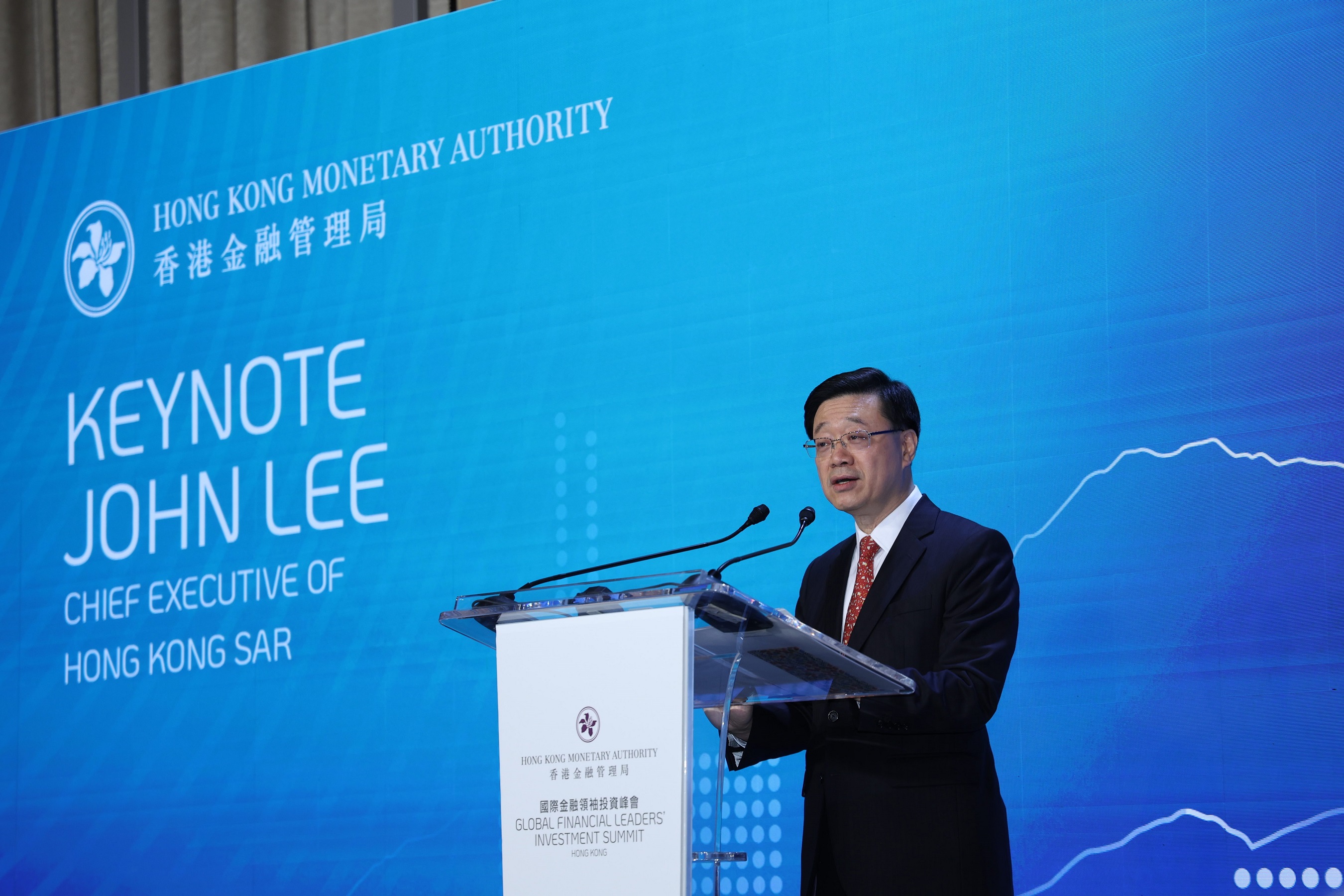
John Lee Ka-chiu, Chief Executive of Hong Kong SAR
Eddie Yue, Chief Executive of the Hong Kong Monetary Authority opened the Global Financial Leaders’ Investment Summit taking place from 2-3 November in Hong Kong.
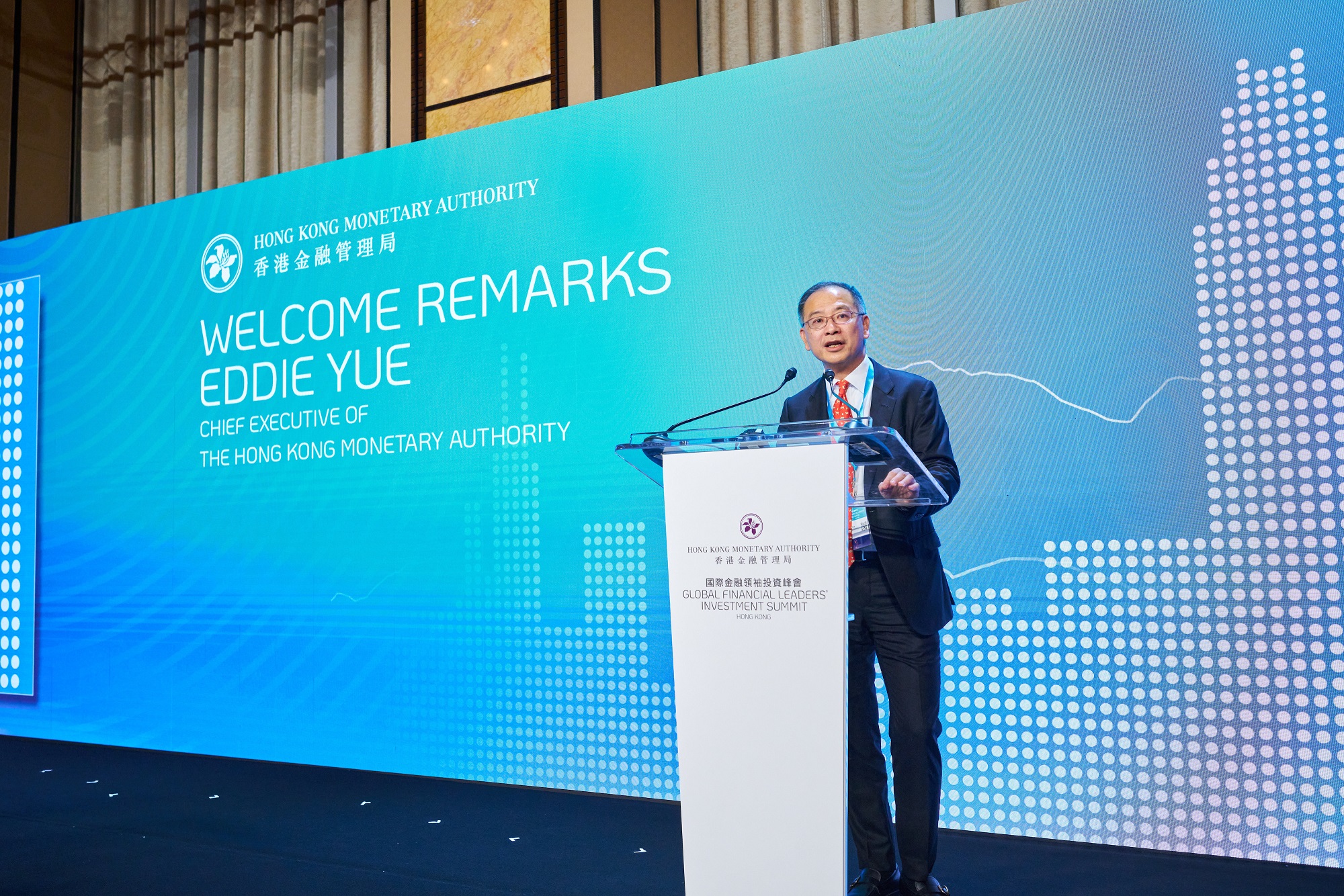 Eddie Yue Wai-man, Chief Executive of Hong Kong Monetary Authority
Eddie Yue Wai-man, Chief Executive of Hong Kong Monetary Authority
09:15-09:55 China Policy Session – Perspectives of Chinese Financial Regulators
Eddie Yue, Chief Executive of the Hong Kong Monetary Authority held conversations with the leadership of three financial regulators in China. Yi Gang, Governor of the People’s Bank of China, explained that despite headwinds including Covid, the Chinese economy is broadly on track and the potential growth rate remains within a reasonable range. He pointed to strong fundamentals including China’s vast domestic market, subdued inflation, and the growing pool of middle class consumers. Additionally, Yi explained that monetary policy is accommodative and supporting the real economy, providing ample liquidity and keeping financing costs low. The yuan has remained stable against a basket of currencies; while it has depreciated against the US dollar, it has appreciated against some others. The People’s Bank of China recognises that Hong Kong has always been and will continue to be a vital connector between Mainland China and the international markets, Yi said. He pointed to the city’s remarkable resilience, and its great potential to deepen connections with the Mainland, especially when it comes to fintech, green finance, and the Belt and Road initiative.
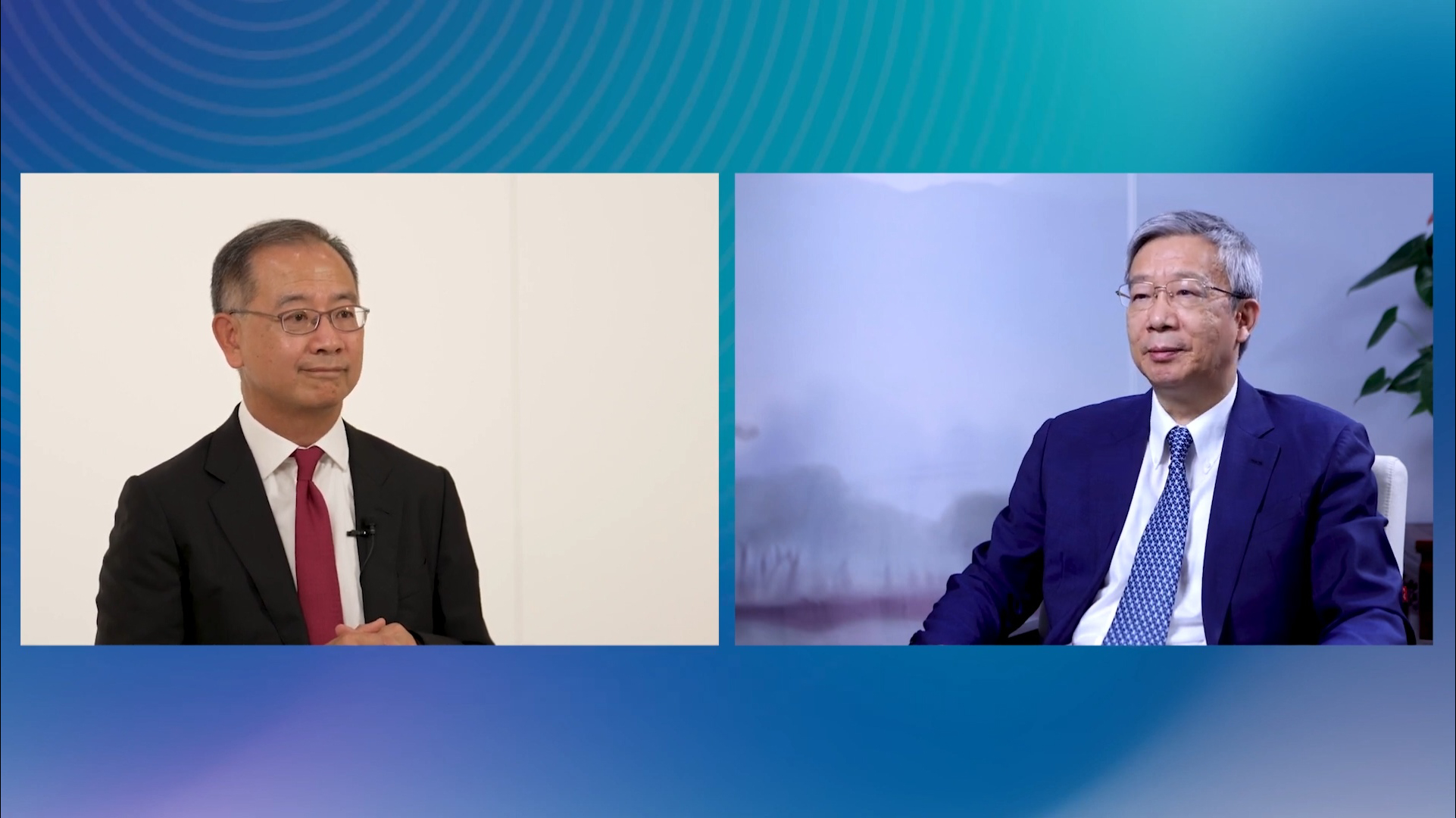 (From left to right) Eddie Yue, Chief Executive of Hong Kong Monetary Authority; YI Gang, Governor of the People’s Bank of China
(From left to right) Eddie Yue, Chief Executive of Hong Kong Monetary Authority; YI Gang, Governor of the People’s Bank of China
Eddie Yue next spoke with Xiao Yuanqi, Vice Chairman of the China Banking and Insurance Regulatory Commission. Asked about the state of the Chinese property market and its impact on Mainland Chinese banks, Xiao said that the exposure of banks to the real estate sector is low. He also pointed out that over the last 20 years, the default rate for home mortgage loans has been only 0.1%. Turning to foreign investment, Xiao argued that for China to achieve a high quality economy, it must have a quality capital market. Hong Kong’s role in that ambition is irreplaceable, he said. At the same time, he reiterated that China welcomes foreign capital. He pointed to the more than 40 legal entities and more than 100 branches that foreign financial institutions have set up in China. As for Mainland Chinese financial institutions’ expansion abroad, Xiao emphasised the importance of institutions serving the needs of local clients, strong governance, and ensuring the right balance between local and international talent.
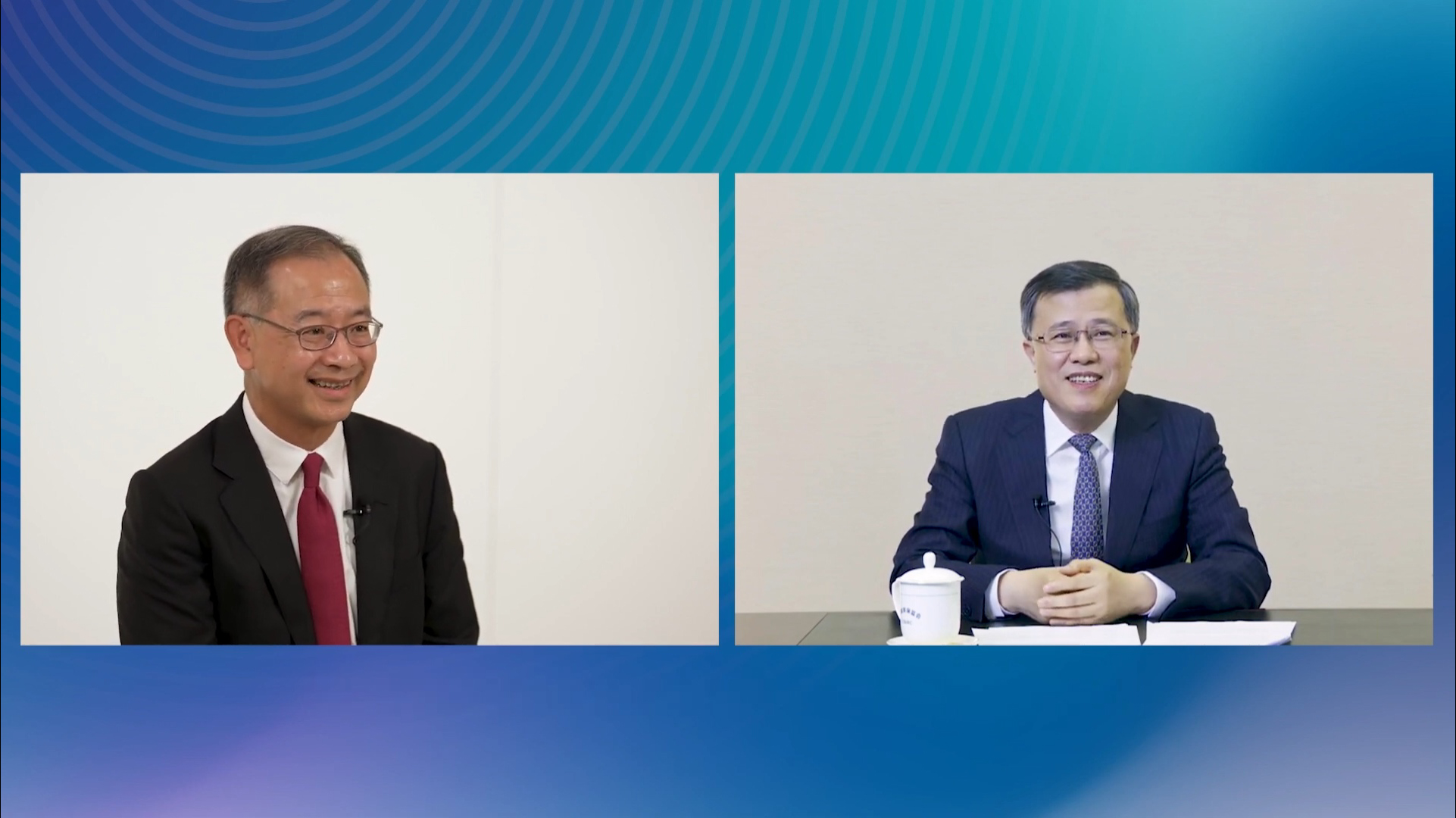 (From left to right) Eddie Yue, Chief Executive of Hong Kong Monetary Authority; XIAO Yuanqi, Vice Chairman of the China Banking and Insurance Regulatory Commission
(From left to right) Eddie Yue, Chief Executive of Hong Kong Monetary Authority; XIAO Yuanqi, Vice Chairman of the China Banking and Insurance Regulatory Commission
Finally, Eddie Yue spoke to Fang Xinghai, Vice Chairman of the China Securities Regulatory Commission. Fang said that China will continue to open up because it is good for China – by attracting top class international players to China’s capital markets, it will help build a high quality capital market and support high quality economic growth. Fang added that China’s opening up would be good for the rest of the world too, and that it is the ambition of President Xi Jinping and all of China to share China’s growth with the rest of the world. Fang explained that building a high quality capital market in Mainland China will take time, hence the importance of Hong Kong, which is already an international financial centre. He pointed to some recent central government initiatives supporting Hong Kong. First, the inclusion of international companies listed in Hong Kong in Stock Connect, which will allow them to tap into Mainland investment, making Hong Kong a more attractive listing destination. Second, the relaunch of the Chinese treasury bond futures market. Third, the introduction of an RMB counter under Stock Connect. All these initiatives will promote the development of Hong Kong as an international financial centre and offshore RMB hub. Finally, Fang reiterated that China’s policy of market based reform and opening up has not changed. He said investors should pay particular attention to President Xi’s recent comments on the centrality of economic growth, and that the door of opening up can only get wider.
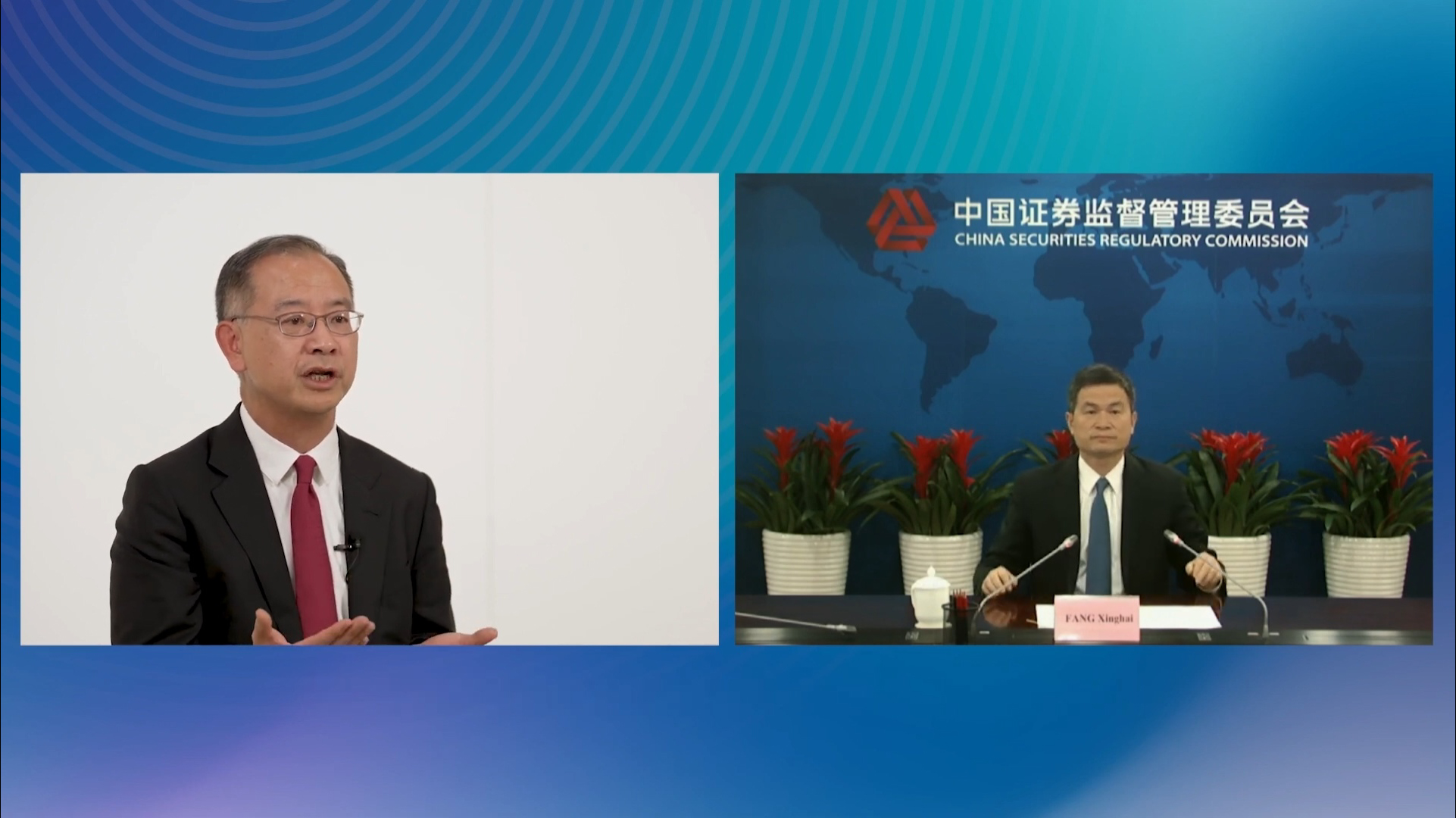 (From left to right) Eddie Yue, Chief Executive of Hong Kong Monetary Authority; FANG Xinghai, Vice Chairman of the China Securities Regulatory Commission
(From left to right) Eddie Yue, Chief Executive of Hong Kong Monetary Authority; FANG Xinghai, Vice Chairman of the China Securities Regulatory Commission
09:55-10:50 Panel Discussion: Navigating Through Uncertainty
Stagflation risks and rising interest rates, combined with geopolitical conflicts and tensions, are disrupting global economic outlook and financial markets. With more uncertainties and headwinds ahead, businesses are rethinking how they can stay resilient and navigate through the rebalancing period and emerging trends. The panellists share their insights on how they and their stakeholders are adapting their strategies, operation and investment approaches to cope with the challenges and capture the opportunities amid the turbulence.
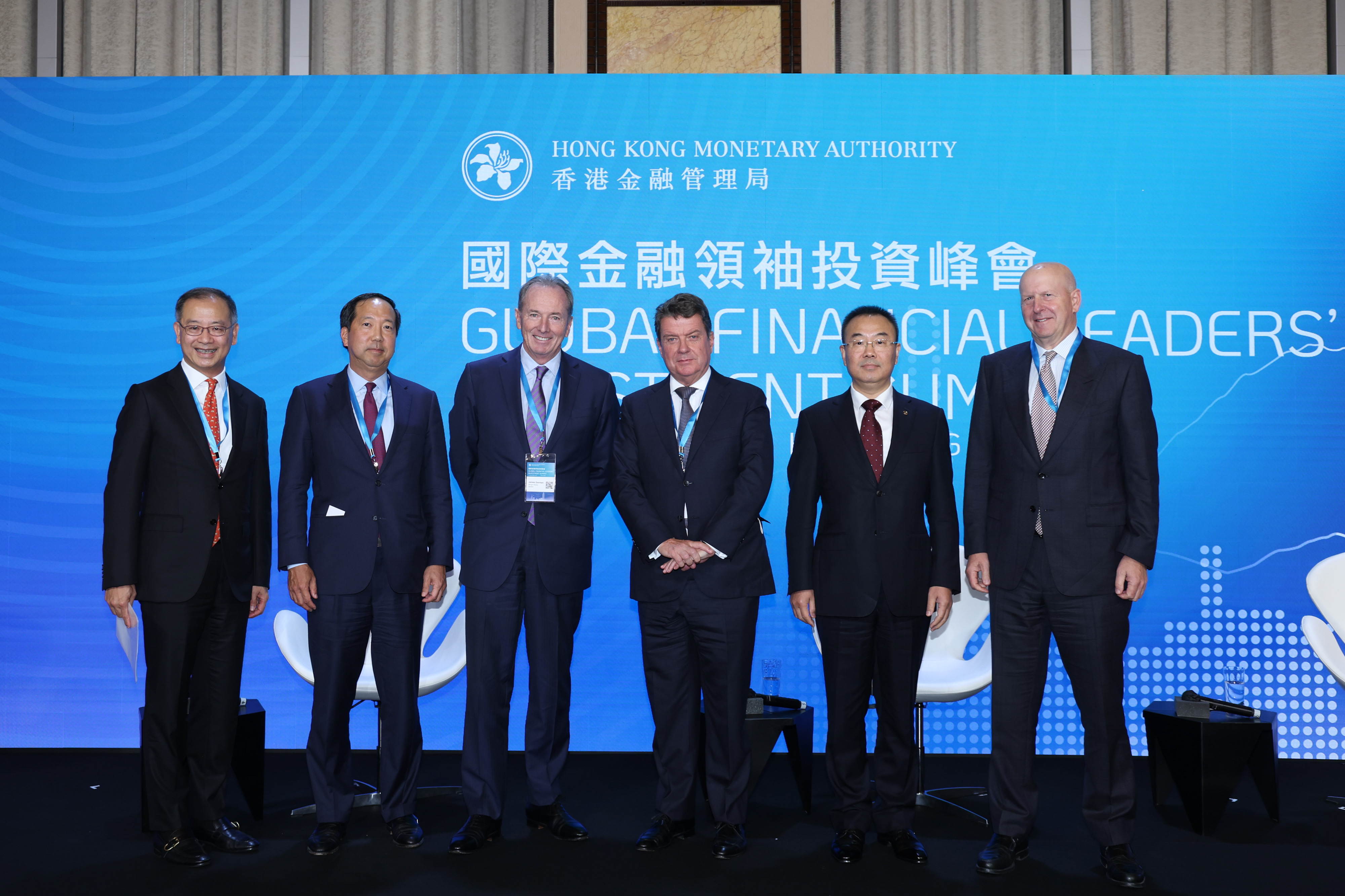 (From left to right) Eddie Yue, Chief Executive of the Hong Kong Monetary Authority; Michael Chae, Chief Financial Officer and Senior Managing Director of Blackstone; James Gorman, Chairman and Chief Executive Officer of Morgan Stanley; Colm Kelleher, Chairman of UBS Group AG; LIU Jin, President of Bank of China; David Solomon, Chairman and Chief Executive Officer of Goldman Sachs
(From left to right) Eddie Yue, Chief Executive of the Hong Kong Monetary Authority; Michael Chae, Chief Financial Officer and Senior Managing Director of Blackstone; James Gorman, Chairman and Chief Executive Officer of Morgan Stanley; Colm Kelleher, Chairman of UBS Group AG; LIU Jin, President of Bank of China; David Solomon, Chairman and Chief Executive Officer of Goldman Sachs
11:05-11:55 Panel Discussion: Sustainable Finance – from Paris to Sharm el-Sheikh and beyond
With climate change and carbon reduction taking the centre stage in the financial sector, there is growing demand for the integration of sustainability and ESG considerations into financial institutions’ investment processes and operations. This presents opportunities and challenges for Hong Kong and the rest of Asia, including product development, risk management and disclosure, data, and talent and capacity building. The panellists share their insights on the current state of the sustainable finance industry, how their institutions are approaching the issues, and how the industry will evolve.
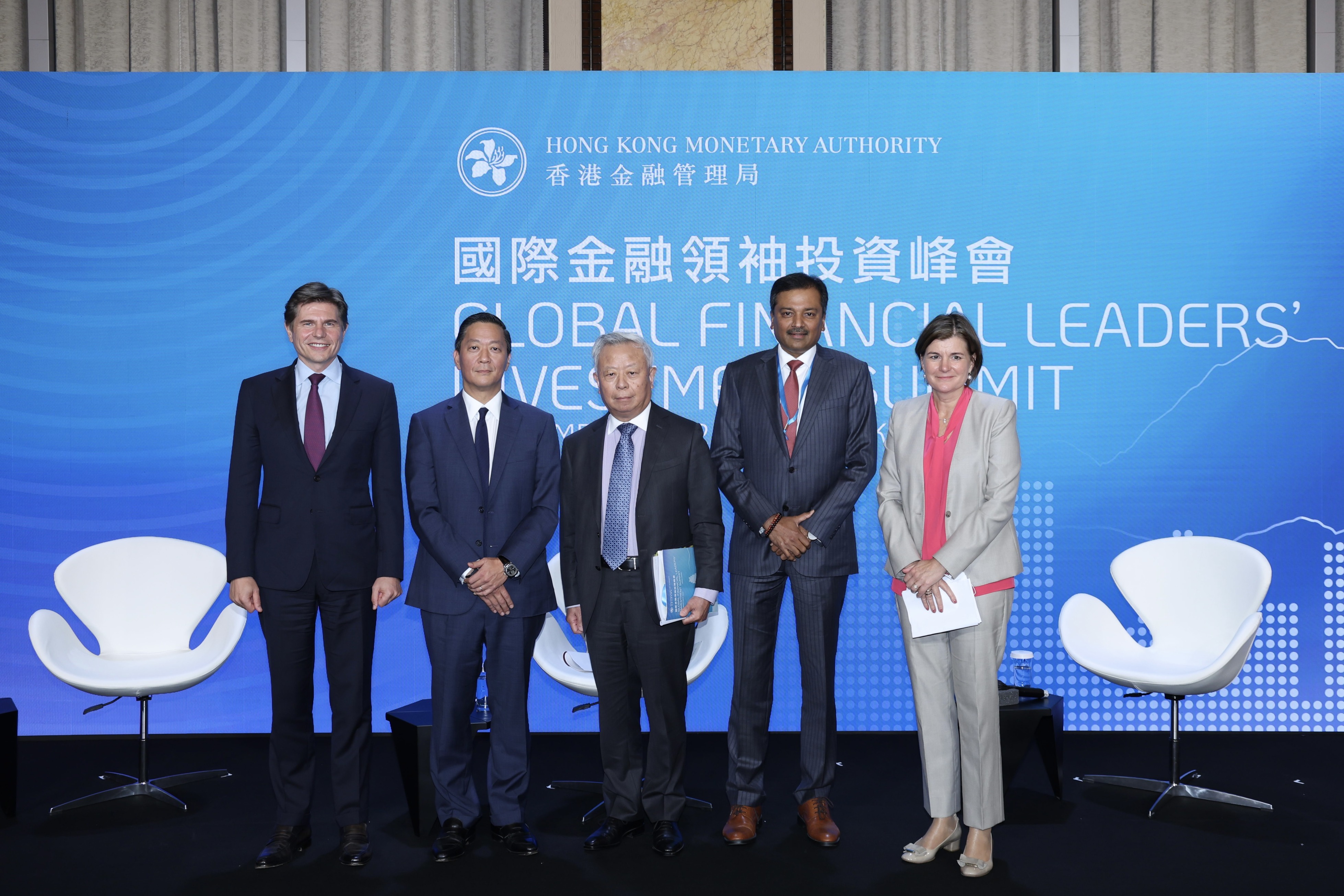 (From left to right) Nicolas Aguzin, Chief Executive Officer of HKEX; Joseph Bae, Co-Chief Executive Officer of KKR; Jin Liqun, President and Chair of the Board of Directors of Asian Infrastructure Investment Bank; Anand Selvakesari, Chief Executive Officer of Personal Banking & Wealth Management of Citigroup; Hanneke Smits, Chief Executive Officer of BNY Mellon Investment Management
(From left to right) Nicolas Aguzin, Chief Executive Officer of HKEX; Joseph Bae, Co-Chief Executive Officer of KKR; Jin Liqun, President and Chair of the Board of Directors of Asian Infrastructure Investment Bank; Anand Selvakesari, Chief Executive Officer of Personal Banking & Wealth Management of Citigroup; Hanneke Smits, Chief Executive Officer of BNY Mellon Investment Management
11:55-12:45 Panel Discussion: Technology, Innovation and the Future of Finance
The panellists discussed how technologies such as artificial intelligence, big data, distributed ledger, cryptoassets and DeFi have been changing the industry. There was agreement that traditional financial institutions need to be fully engaged with the development of these technologies, and that financial ecosystems need to catch up with products and technology, particularly when it comes to keeping consumers safe. The power of financial technology to fight organized crime was also discussed, including instances financial institutions have collaborated to tackle fraud and human trafficking. Panellists also argued that technology should be free to innovate – but that regulators should step in where technology creates asset classes.
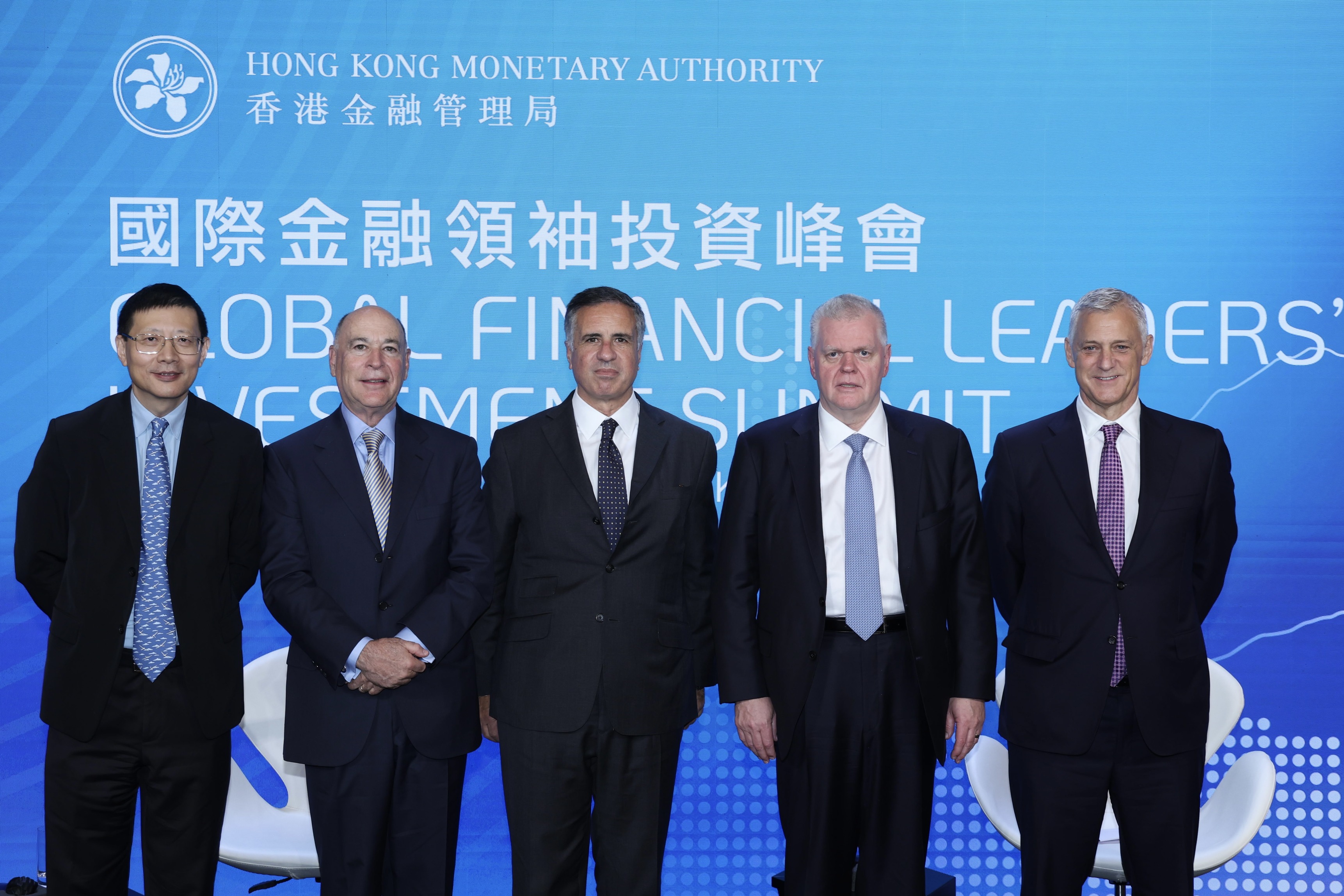 (From left to right) Neil Shen, Founding & Managing Partner of Sequoia China; Rob Kapito, President of BlackRock; Daniel Pinto, President and Chief Operating Officer of JPMorgan Chase; Noel Quinn, Group Chief Executive of HSBC; Bill Winters, Group Chief Executive of Standard Chartered
(From left to right) Neil Shen, Founding & Managing Partner of Sequoia China; Rob Kapito, President of BlackRock; Daniel Pinto, President and Chief Operating Officer of JPMorgan Chase; Noel Quinn, Group Chief Executive of HSBC; Bill Winters, Group Chief Executive of Standard Chartered
12:45-12:55 Keynote by Paul Chan, Financial Secretary of the Government of Hong Kong SAR
The Financial Secretary Paul Chan’s speech set out the ambition for Hong Kong to further develop as a hub for both fintech and sustainable finance in the region. Chan said Hong Kong is already a leader in sustainable finance, and promoting further development of this market is aligned with Hong Kong’s Climate Action Plan 2050 and the National 14th Five-Year Plan. Chan said Hong Kong is already a leader in sustainable finance, and promoting further development of this market is aligned with Hong Kong’s Climate Action Plan 2050 and the National 14th Five-Year Plan. Chan also explained how Hong Kong can own the future of finance by promoting the growth of its fintech sector. As a world-leading international finance centre and part of the Greater Bay Area (GBA), Hong Kong is uniquely positioned to be a leader in fintech. Hong Kong has adopted a multi-pronged approach in fostering fintech development. It includes the Hong Kong Monetary Authority’s “Fintech 2025” strategy, which will encourage banks to move forward in areas such as cross sectoral fintech solutions. And recent policy statement by the Government on virtual assets will ensure Hong Kong provides an environment that is conducive to the development of the sector. Looking to the wider region, Hong Kong will leverage its role as an international financial centre to connect Hong Kong fintech companies with users, partners and investors regionally and internationally. The launch of a cross-border GBA sandbox is a case in point. To help make all this possible, Hong Kong will employ even bolder measures to attract and develop Mainland and overseas talent.
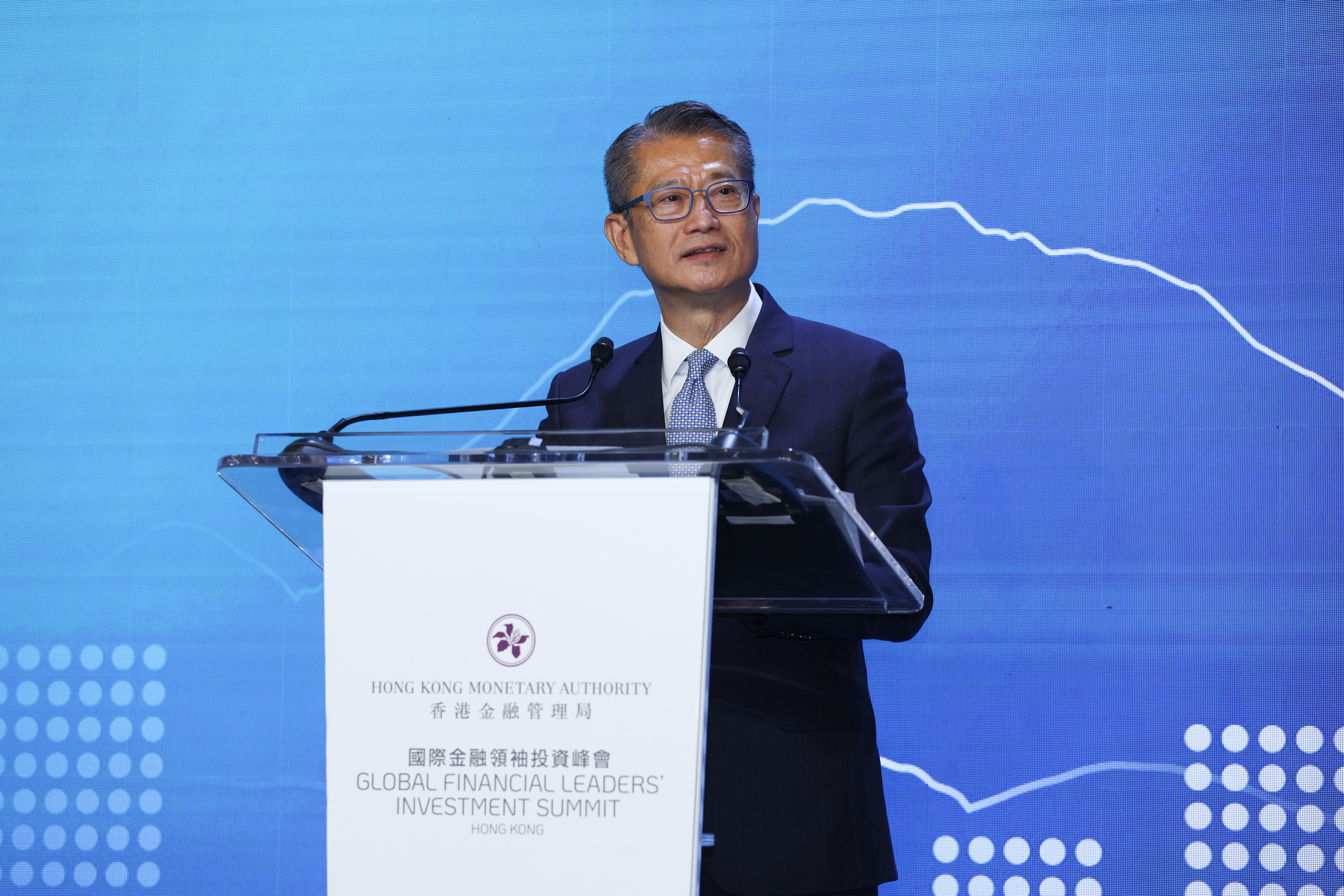 Paul Chan Mo-po, Financial Secretary of the Government of Hong Kong SAR
Paul Chan Mo-po, Financial Secretary of the Government of Hong Kong SAR
13:35-14:20 Fireside chat with Mark Carney
Fireside chat with Mark Carney, Vice Chair of Brookfield Asset Management and Head of ESG and Impact Fund Investing and United Nations Special Envoy on Climate Action and Finance, hosted by Norman Chan, Senior Advisor, Hong Kong Academy of Finance and former Chief Executive of the Hong Kong Monetary Authority. Mark Carney talked about the consequences and risks that may arise as the world transitions from a period of loose monetary policy and low inflation to a period of greater uncertainty. He said there will be a need to rebalance supply and demand on a global scale, and that the world could be heading for a recession. Tensions could emerge in the global financial system, he warned, for example between fiscal and monetary policies; and between price and financial stability. These are limiting central banks’ room for manoeuvre. Turning to the climate, Mr. Carney argued for more resources to be allocated to energy transition. While policies are becoming more aggressive, there is still a long way to go. Fixing climate change is the greatest business opportunity of our time, he said.
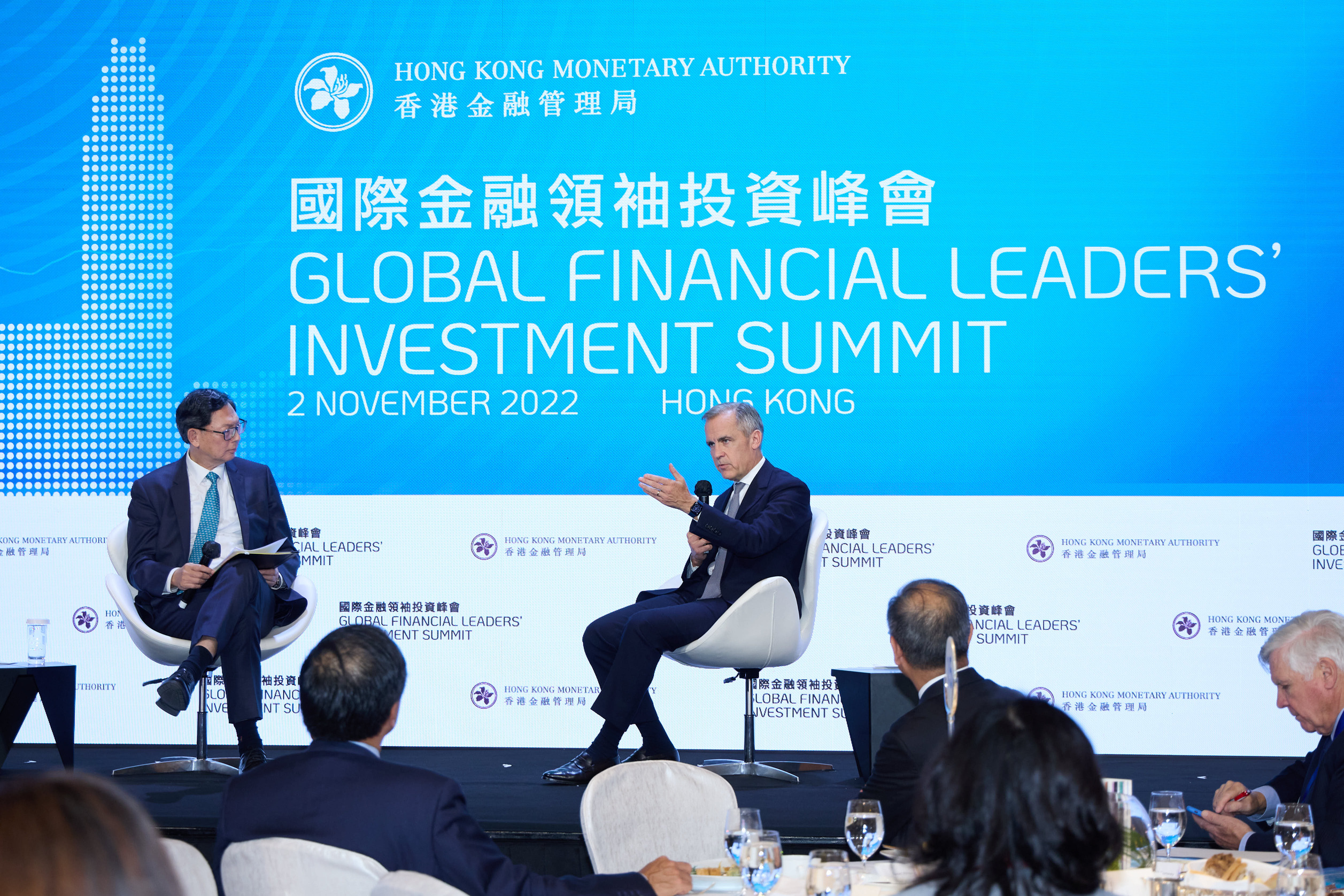 (From left to right) Norman Chan, Senior Advisor, Hong Kong Academy of Finance and former Chief Executive of Hong Kong Monetary Authority; Mark Carney, Vice Chair of Brookfield Asset Management and Head of ESG and Impact Fund Investing and United Nations Special Envoy on Climate Action and Finance
(From left to right) Norman Chan, Senior Advisor, Hong Kong Academy of Finance and former Chief Executive of Hong Kong Monetary Authority; Mark Carney, Vice Chair of Brookfield Asset Management and Head of ESG and Impact Fund Investing and United Nations Special Envoy on Climate Action and Finance



 Eddie Yue Wai-man, Chief Executive of Hong Kong Monetary Authority
Eddie Yue Wai-man, Chief Executive of Hong Kong Monetary Authority (From left to right) Eddie Yue, Chief Executive of Hong Kong Monetary Authority; YI Gang, Governor of the People’s Bank of China
(From left to right) Eddie Yue, Chief Executive of Hong Kong Monetary Authority; YI Gang, Governor of the People’s Bank of China (From left to right) Eddie Yue, Chief Executive of Hong Kong Monetary Authority; XIAO Yuanqi, Vice Chairman of the China Banking and Insurance Regulatory Commission
(From left to right) Eddie Yue, Chief Executive of Hong Kong Monetary Authority; XIAO Yuanqi, Vice Chairman of the China Banking and Insurance Regulatory Commission (From left to right) Eddie Yue, Chief Executive of Hong Kong Monetary Authority; FANG Xinghai, Vice Chairman of the China Securities Regulatory Commission
(From left to right) Eddie Yue, Chief Executive of Hong Kong Monetary Authority; FANG Xinghai, Vice Chairman of the China Securities Regulatory Commission (From left to right) Eddie Yue, Chief Executive of the Hong Kong Monetary Authority; Michael Chae, Chief Financial Officer and Senior Managing Director of Blackstone; James Gorman, Chairman and Chief Executive Officer of Morgan Stanley; Colm Kelleher, Chairman of UBS Group AG; LIU Jin, President of Bank of China; David Solomon, Chairman and Chief Executive Officer of Goldman Sachs
(From left to right) Eddie Yue, Chief Executive of the Hong Kong Monetary Authority; Michael Chae, Chief Financial Officer and Senior Managing Director of Blackstone; James Gorman, Chairman and Chief Executive Officer of Morgan Stanley; Colm Kelleher, Chairman of UBS Group AG; LIU Jin, President of Bank of China; David Solomon, Chairman and Chief Executive Officer of Goldman Sachs (From left to right) Nicolas Aguzin, Chief Executive Officer of HKEX; Joseph Bae, Co-Chief Executive Officer of KKR; Jin Liqun, President and Chair of the Board of Directors of Asian Infrastructure Investment Bank; Anand Selvakesari, Chief Executive Officer of Personal Banking & Wealth Management of Citigroup; Hanneke Smits, Chief Executive Officer of BNY Mellon Investment Management
(From left to right) Nicolas Aguzin, Chief Executive Officer of HKEX; Joseph Bae, Co-Chief Executive Officer of KKR; Jin Liqun, President and Chair of the Board of Directors of Asian Infrastructure Investment Bank; Anand Selvakesari, Chief Executive Officer of Personal Banking & Wealth Management of Citigroup; Hanneke Smits, Chief Executive Officer of BNY Mellon Investment Management (From left to right) Neil Shen, Founding & Managing Partner of Sequoia China; Rob Kapito, President of BlackRock; Daniel Pinto, President and Chief Operating Officer of JPMorgan Chase; Noel Quinn, Group Chief Executive of HSBC; Bill Winters, Group Chief Executive of Standard Chartered
(From left to right) Neil Shen, Founding & Managing Partner of Sequoia China; Rob Kapito, President of BlackRock; Daniel Pinto, President and Chief Operating Officer of JPMorgan Chase; Noel Quinn, Group Chief Executive of HSBC; Bill Winters, Group Chief Executive of Standard Chartered Paul Chan Mo-po, Financial Secretary of the Government of Hong Kong SAR
Paul Chan Mo-po, Financial Secretary of the Government of Hong Kong SAR (From left to right) Norman Chan, Senior Advisor, Hong Kong Academy of Finance and former Chief Executive of Hong Kong Monetary Authority; Mark Carney, Vice Chair of Brookfield Asset Management and Head of ESG and Impact Fund Investing and United Nations Special Envoy on Climate Action and Finance
(From left to right) Norman Chan, Senior Advisor, Hong Kong Academy of Finance and former Chief Executive of Hong Kong Monetary Authority; Mark Carney, Vice Chair of Brookfield Asset Management and Head of ESG and Impact Fund Investing and United Nations Special Envoy on Climate Action and Finance